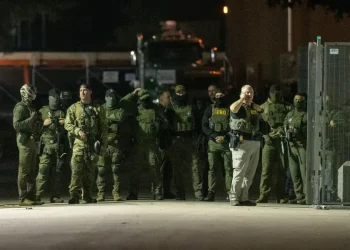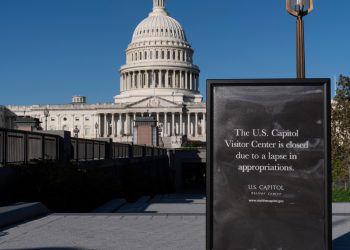TThe last remaining piece of the Voting Rights Act of 1965 — Section 2, which empowers the federal government to protect voters from racial gerrymandering intended to dilute black political power — appears to be meeting an untimely end. During oral arguments in Louisiana v. Callais on Wednesday, the U.S. Supreme Court appeared poised to strike down Section 2, completing the gradual rollback of the Voting Rights Act that it has pursued for more than a decade.
The case stems from new congressional district maps that were drawn in Louisiana after the 2020 census, which found both that the state was eligible for six seats in the House of Representatives and that its population was about one-third Black. The state initially drew maps that featured only one majority-black congressional district, rejecting seven more racially equitable maps; voters sued, and federal courts ordered Louisiana to comply with the Voting Rights Act by drawing new maps in which black voters would be the majority in a second district, thus reflecting their share of the population and giving black Louisianans an equal chance to elect representatives of their choice.
But now, a group of people identifying as “non-African American voters” have filed a lawsuit to have these racially proportionate maps thrown out, arguing that enforcing the VRA violates their own rights under the 14th and 15th Amendments. They claim that maps developed to address racial discrimination against black people actually constitute racial discrimination against non-black (read: white) people. The court seems likely to side with them.
If they do, it will mark the end of the Voting Rights Act, widely considered the crowning achievement of the civil rights movement, which the Supreme Court under John Roberts has been dismantling for years. In the 2013 case Shelby County v. Holder, the court struck down much of Section 5, which required jurisdictions with a history of racial discrimination in voting to obtain prior permission from the federal government to change their election laws.
In subsequent cases, the court has repeatedly narrowed the conditions under which litigants can bring voting rights claims and expanded states’ leeway to pass voting laws that previously would have been found discriminatory. Writing for the majority in Shelby, Chief Justice Roberts asserted that racial animus and inequality had declined sufficiently that such a regime was unnecessary and even violated states’ rights. As states imposed a series of new voting restrictions afterward, the gap between black and white voter turnout rates widened significantly. It expanded twice as much in districts that were previously subject to the Article 5 preclearance regime.
On Wednesday, the court seemed intent on applying the same logic it used in Shelby County to Section 2, requiring Janai Nelson, the head of the NAACP Legal Defense Fund, to justify why Section 2 should still be effective and should not be considered to have expired in some way. Justices Kavanaugh and Alito asserted that racial gerrymandering was justified if it was framed as partisan gerrymandering—that is, what mattered was the stated or professed intentions of legislators, not the racially discriminatory impact of the gerrymander.
Previous Supreme Court precedent, as well as extensive evidence from the congressional record, has said that discriminatory impact, rather than intent, is sufficient to constitute unlawful racial discrimination — but during oral arguments, Republicans in court, as well as those representing the litigants, didn’t seem to think that should matter. As she refuted these arguments under the guise of asking questions from the bench, one could hear the exhaustion in Ketanji Brown Jackson’s voice. The cures, she stammered, “are so race-related, because race is the original problem!” » Jackson was the Court’s most passionate and eloquent defender of the Reconstruction Amendments and the legacy of the civil rights movement, but she seemed to know that her colleagues were not listening.
The case reflects two major trends in the Roberts Court: hostility toward racial justice claims brought by minorities and a desire to reverse the Civil Rights Act and Reconstruction Amendments to create interpretations in which these legal traditions serve to consolidate, rather than challenge, historical hierarchies of race and gender. Louisiana’s attorney general — who has switched sides in the case since it was initially argued last year, joining opposition to the Voting Rights Act — argued that assuming black voters would vote differently from white voters — which they overwhelmingly do in Louisiana — would be unconstitutionally imposing a racial stereotype. This easy fiction aroused the exasperation of Justice Kagan.
But the attorney general knew his audience. Roberts has long been an enemy of practices that attempt to address historic and ongoing racial discrimination, arguing that the law requires state and private actors to ignore such projects and attempt seemingly race-blind policies in everything from voting rights enforcement to college admissions — no matter how racist such practices prove to be against Black Americans. “The way to end discrimination on the basis of race,” he once memorably said, “is to stop discriminating on the basis of race” – that is, to stop trying to justify or combat racism through official policy. The result will be that if the court rules in favor of Louisiana, it will no longer be illegal, in practice, to racially redistrict congressional districts in order to minimize and dilute the power of black voters. But it will be illegal to use race to redistrict in a way that restores the power of black voters.
It is apparently through this fanciful and motivated reasoning that Roberts and his colleagues have decided that any measure intended to guarantee the right to vote and equality for black Americans actually violates the very constitutional amendments that were supposed to guarantee their right to vote and equality. The Voting Rights Act does not violate the 15th Amendment; it enforces it and has given the United States, for the nearly 60 years since its enactment, its only plausible claim to being a true democracy. Saying that the VRA contradicts the 15th Amendment is more than just bad reasoning. This is bad faith. But it is more and more often bad faith that underlies the functioning of the Supreme Court.
If the Supreme Court rules in favor of “non-African American” voters and strikes down what remains of the Voting Rights Act, as is expected, then a decision will likely be issued sometime in June, just months before the November 2026 midterm elections. The resulting racial gerrymanders are expected to give Republicans 19 seats in the House.









